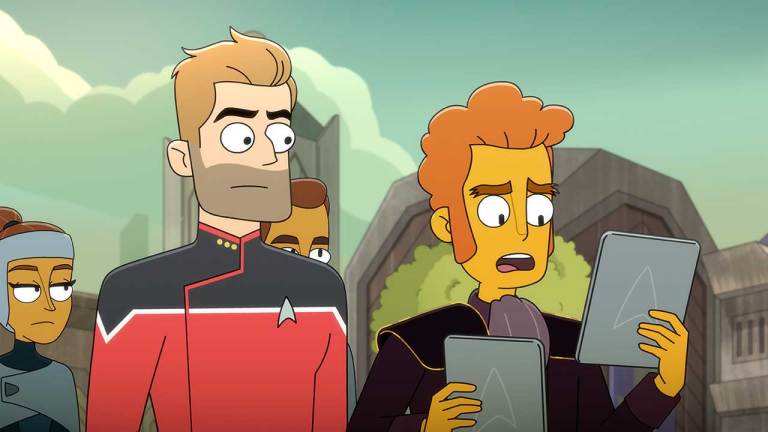How Star Trek: Lower Decks Made the Franchise Funny Again
We talked to the cast of Lower Decks ahead of Season 2, about why comedy is an inherent part of the Star Trek legacy.

“The more complex the mind, the greater the need for the simplicity of play.” – Captain Kirk, “Shore Leave”
Star Trek can be a complicated fandom, with a history of hundreds of storylines, philosophies and canonical quandaries for fans to endlessly puzzle over. It can be a challenge to keep all of it together, but sometimes making light of it can allow fans—new and old—to experience a greater comfort with the franchise and simply have fun with it. The talented Lower Decks cast gets the humor behind this show and they understand its impact on the franchise. That’s the secret behind Star Trek: Lower Decks: being bold and knowing how much the subject can take. Laughter begets play. The more laughter Lower Decks can inspire, the greater fans get to play with the franchise, extend its longevity, but most importantly, have fun.
Den of Geek had some time to sit down with Lower Decks‘ Tawny Newsome (Mariner), Jack Quaid (Boimler), Eugene Cordero (Rutherford) and Noel Wells (Tendi), ahead of Season 2, to have a conversation about playing and laughing within the franchise that has entertained fans for decades.
“Star Trek was always funny!” Newsome says, decisively. “That’s the default answer, right? I mean, whether it was Joe Piscopo or Data trying out stand-up, it’s always been funny because it’s such a workplace show. Everyone works together – interpersonal things, and the characters are so richly drawn that it’s going to be funny.”
“Laughter makes us appreciate things more,” add Cordero. “Any time you can have fun with something, that makes you feel more human. If you can find what’s imperfect about what you love, it makes it more perfect, more relatable to you.”
To laugh at something like a fandom doesn’t necessarily diminish its value. Instead, it brings the fan to the point where they become closer to the fandom. It makes it more accessible and attainable.
“We watch things,” Cordero continues. “We love Star Trek and we love the aspects of it because sometimes we think they are unattainable in that what we hope to be. It feels so serious to ‘get there.’ But the more you can joke around and have fun with it, or see the flaws like the way Lower Decks is? Then you start to think, ‘oh, that could be me.’ That possibility makes the play more fun.”
If there is a word that describes the style of humor in this show, it’s “belonging.” Something every Star Trek fan can identify with in terms of being part of a crew, or even the Vulcan philosophy of IDIC, Star Trek: Lower Decks, laughing at Easter eggs and inside jokes that gives fans a personal sense of belonging.
“The writing is so great that the fans are in on the joke with us,” Quaid says. “You know – the koala, what does it know? All the bits from Season 1, I love that it’s something that Trek fans can come together with and a have a great time.”
The historical aspect of Star Trek can be one of its most intimidating features. With nine iterations of the franchise (and more on the way), multiple feature films, dozens of novels, hundreds of comics and a plethora of other apocryphal formats, sometimes it’s good take a pause and allow a show like Lower Decks to include relevant moments in the franchise’s history as nuggets of pure comedy in order to pause and reflect on the nature of the science fiction material.
“Laughter really is an equalizer,” says Wells. “Especially with a franchise with such a long history, like Star Trek. You start taking it too seriously? The laughter makes a nice, sweet refresh. It’s like a duster, right? Dust off some stuff! That’s the same way with play. The joy of play is making new connections and revitalizing some things that you thought you know. But there’s a whole other path that you can do down.”
It’s good to take some time and ask questions about the relevant aspects of the franchise’s history that appear in this show. For experienced fans, it’s a pleasant chance to relive those moments, have a few chuckles or even to explain them to new fans and go back and watch the episode. “You trust the serious stuff more when you feel you can find the play in it. It makes you more comfortable with it,” Cordero notes.
Comedy also needs good timing for it to be effective. Ask any comedian. Star Trek: Lower Decks has a pace that’s high energy, effortlessly bouncing from one joke to the next.
“My last record, I did bring four large-sized iced coffees to the record,” says Newsome. “It’s not a joke, and I just powered through them during the course of a four-give hour record! Yeah – I ran late. Mike McMahan said ‘I’d rather have you late and over-caffeinated than on time and sad!’”
“For me,” says Quaid, “I realized I needed to reduce the amount of episodes per recording or my voice will blow out and then Boimler starts to sound like a nightmare!“
At this point in the interview, Quaid was kind enough to demonstrate the audible nature of that nightmare. Shrilly shrieking a whiny “MARIN-ER – WHAT ARE YOU DOING?” into the microphone. As a result, a sizable chunk of the interview time was shortened due to all participants in the interview reduced to paroxysms of wild laughter.
“We have to protect that beautiful Jack Quaid scream! It’s gold!” Newsome throws in for added measure
There’s a sense of boldness that comes out in the comedy of Lower Decks. Both Newsome and Quaid’s characters marshal the scrappiness of the underdog that evokes a laughter that doesn’t reduce the nature of the franchise. The secret to funny is knowing how much the subject can take.
“I think it shows how robust Star Trek is as a franchise,” says Newsome, “that in the same episode of 22 minutes of animated comedy that we are both able to poke fun at it and laugh at it and also take the stakes of that episode so seriously that people get emotional and care about what happens to the characters. Balancing that abrupt tonal shift and holding those things together just proves how robust the brand is.”
Star Trek is a show with elevated science fiction concepts. Lower Decks relaxes fans’ sense of accessibility by making light of familiar storylines, yet also pays homage to those events that went before that makes them more relatable through play. The humor doesn’t just make fun of the franchise, it invites fans to explore the subject material in greater detail, and makes the resulting jokes not merely inside ones, but something everyone can share.
“I think there is lot more to this, because of the spirit of play within the Lower Decks characters and the premise of the show,” says Cordero. “It gives you an underdog feel, that [there is] this mentality that everyone can ‘get there’. Eventually, everyone can be on the bridge and be serious. But in order to get there: you have to work hard, go through ups and downs with people, and I think that gives you the opportunity, it gives fans the chance to see themselves in our characters’ shoes.”
Wells adds: “Yeah, I think something that has a lot of history, like Star Trek, to be able to infuse that sense of play invents a new avenue for the way that you can view the franchise. It provides a new lens and you can go back in the past with that new lens that can augment the way that you relate to the all of it, including moving forward. You can take from the show and transfer whatever elements of play that resonate with you.”
Quaid thinks this comes from the expansive nature of Star Trek storytelling and fandom.
“If there’s anything that Star Trek has, it’s legs,” he says. “So, it’s been happening forever: finding a little section within that’s devoted to humor: poking fun at itself without utterly roasting itself is important for a fandom to have. With everything that’s taken super-serious? You need something that deconstructs itself, breaks it down and is able to laugh. You’re way better off if you can laugh at yourself!”
If there’s anything Star Trek gets, it’s the desire to be bold. As Newsome noted, it’s the robustness of the franchise that allows that freedom. Star Trek fans are going to laugh at this because the humor is not only meant for them, it’s meant for them to share. This is a kind of identification that even the most jaded Trek fan can’t help but lift a smile at, in recognition of the shared history of an inside joke. We laugh at tribbles. We love the cameos. Why? Because Star Trek fans can easily identify with the humor and share with others why it’s so funny.
Season 2 of Star Trek: Lower Decks promises to bring more laughs to Star Trek fans beginning on August 12. With Season 1 behind them, the crew of the USS Cerritos looks forward to bringing more Star Trek inside jokes and humor that was meant for fans to laugh in ways … no one has laughed before.
